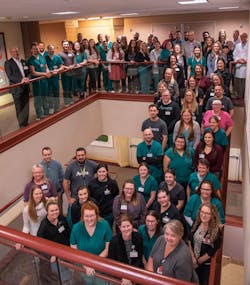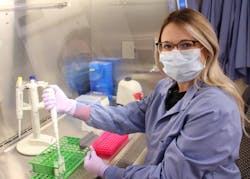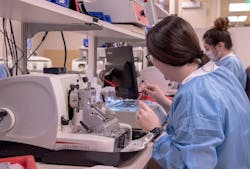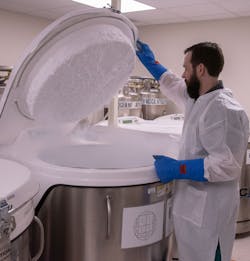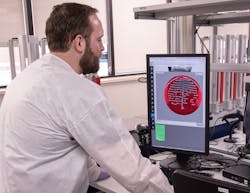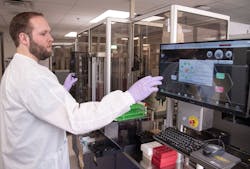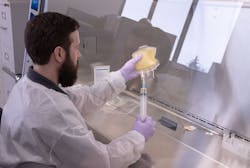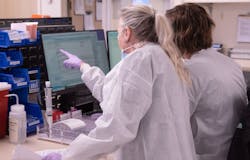Department of Pathology and Laboratory Medicine, Avera McKennan Hospital & University Health Center — a culture of quality improvement focused on patients
Medical Laboratory Observer’s 2023 Lab of the Year is the Department of Pathology and Laboratory Medicine at Avera McKennan Hospital & University Health Center. The Avera Health system serves Upper Midwest residents of South Dakota, North Dakota, Minnesota, Nebraska, and Iowa and covers a 72,000-square-mile footprint. Avera McKennan, the flagship facility for the health system, is based in Sioux Falls, South Dakota. Here, the Avera McKennan Laboratory serves as the clinical laboratory for the 545-bed hospital and its local clinics, as well as the reference laboratory for the whole Avera Health system. The laboratory consists of 16 departments and covers testing from basic hematology and chemistry to cutting-edge cell therapies, in-house human leukocyte antigen (HLA), and specialized chemistry. And the laboratory will soon include liquid chromatography-mass spectrometry analysis.
Lab of the Year nominations are judged on achievements across six categories: customer service, education and training, lab inspections, productivity, strategic outlook, and teamwork. MLO received many outstanding nominations this year, and this annual feature is one of the most popular in the magazine. The Avera McKennan Laboratory stood out for its many efforts to take quality to a higher level. These efforts range from its Pre-Analytical Department implementing processes to improve patient communication and satisfaction—and performing scheduled audits of the processes; the Histology Department taking on a project to evaluate specimen submissions for osteomyelitis and identify opportunities for improvement in the handling of these lab tests; and being one of the few medical laboratories in the United States with ISO 15189 accreditation through the College of American Pathologists (CAP), which it first achieved in 2008.
Other notable features of the Avera McKennan Laboratory in each of the six categories follows.
Customer service
Over the past year, Avera McKennan Lab’s Pre-Analytical Department has focused on ways to improve Press Ganey outpatient satisfaction survey scores. The whole staff understands that patient care is everyone’s job, and everyone participates in creating a quality patient experience during daily huddles and staff rounding. One outcome from the Pre-Analytical team was the creation of a patient pamphlet provided by the phlebotomists. On the pamphlet, the phlebotomist provides his or her name and provides the patient a direct phone number for questions and comments. In addition, the Pre-Analytical team strategically places a primary staff member at each service center, so repeat patients are more likely to see a familiar face.
The Pre-Analytical team also implemented the AIDET framework for inpatients and outpatients, which stands for acknowledge, introduce, duration, explanation, and thank you. Through this process, staff understand the importance of acknowledging the patient and introducing themselves, giving accurate wait times, explaining the procedure, and thanking the patient before they leave. Implementing AIDET resulted in a more than 10% increase from the previous quarter in the Press Ganey score surrounding staff’s explanation of tests. The department performs scheduled audits of this process to support continual improvement.The Histology Department undertook a project this year to evaluate the turnaround times from specimen collection to result reporting for osteomyelitis patients. The department used a process map to review its current workflow, which generally took five to six days from collection to results. Having the step-by-step process laid out on a map, staff were able to identify an improvement during the pathology review. The old process had the pathologist reviewing the slides on day four, which could cause a greater delay of one or two days if the sample was collected mid- to late week due to lack of pathology staffing on the weekends. The Histology Department made changes so that slides are assigned to a pathologist the same day the slides are prepared. Due to this change, the turnaround time has been reduced by a minimum of 24 hours (often 48 to 72 hours) compared to the old process.
This change in the process now allows physicians to have results sooner in order to start proper treatment. Patients are positively affected by both treatment and discharges happening sooner. In December there were 24 osteomyelitis cases. The new process equaled a reduction of between 576 and 1,728 hours waiting for results. As a result, the hospital’s quality department is in the process of studying this project’s impact on patient length of stay.Education and training
The Avera McKennan Laboratory had many laboratory assistants who held bachelor’s degrees in biology or chemistry, and through their time in the lab, many gained an interest in becoming medical laboratory scientists (MLS). However, moving, going back to school, and leaving their job to obtain their degree created obvious hurdles. Avera McKennan Laboratory had strong relationships with several universities in the area, particularly South Dakota State University (SDSU).
The laboratory and SDSU came together to discuss ways to build career ladders and roadmaps for students with science degrees to streamline their paths to becoming an MLS. This partnership resulted in an accelerated MLS program for staff and others who already held a science or healthcare-related degree and were interested in the advanced laboratory degree. The program would take one year to complete, with the majority of learning online.
The laboratory invested in equipment and made room to host SDSU-accelerated students for their clinical rotations. Avera McKennan brought additional technology into its education classroom, such as microphones and cameras, to allow students to interact with other students and listen to lectures virtually. Avera McKennan also purchased a microscope for the instructors to conduct slide reviews that would display on a large television allowing students at other sites to view lessons with the students in the room.
The laboratory also proposed to SDSU to place accelerated students on an opposite schedule of traditional four-year students. This has allowed the laboratory to host clinical rotations of the accelerated students in the fall and the four-year students in the spring, allowing the accelerated students to graduate in December. Previously, hiring during the winter was challenging, whereas, in the spring, there was a large pool of candidates due to students graduating. Avera McKennan is now able to hire new graduates twice a year in December and in May.
Lab inspections
The Avera McKennan Laboratory is very diverse and is inspected by several different organizations. Avera McKennan is CAP accredited and also one of the leading laboratories in the ISO 15189 program. In 2008, they became the first hospital-based laboratory and one of the first two medical laboratories in the United States with ISO 15189 accreditation. There are still less than 100 laboratories with CAP ISO 15189 accreditation. Laboratories implementing ISO 15189 strive to create systems that are as efficient and failure resistant as possible, identify opportunities for improvement at all times, and involve and empower staff in the solving of problems and implementation of solutions.
The laboratory is also inspected by the Association for the Advancement of Blood & Biotherapies (AABB) and the U.S. Food and Drug Administration (FDA) for transfusion services, the American Society for Histocompatibility and Immunogenetics (ASHI) for histocompatibility, and the Foundation for the Accreditation for Cellular Therapy (FACT) for the cell therapy program.
The laboratory resources used to maintain quality and inspection-readiness include Visiun and MediaLab. Visiun is a software program used to analyze laboratory performance data. Through this system, the laboratory automates daily, weekly, and monthly performance metrics reports. MediaLab’s software has simplified the lab’s document control tracking and significantly improved the lab’s occurrence monitoring. Management can quickly and easily provide feedback on laboratory errors (occurrences) entered into MediaLab and the quality team monitors MediaLab’s IQE for trends in order to develop process improvements.
Avera McKennan's laboratory began its Lean process improvement journey in 2004. The laboratory has a dedicated Quality Assurance team of medical laboratory scientists to ensure the rigorous Quality Management System plan is followed. The team works with all departments to organize process improvements, conduct root cause analyses for occurrences, and develop quality indicators focused on patient impact. A monthly quality meeting is organized with all coordinators, supervisors, and managers, along with the lab director and medical director to recap the previous month. With a dedication to utilizing technological solutions and Lean tools, Avera McKennan has obtained nearly perfect inspections year after year.Productivity
The Avera McKennan Laboratory has 94.2 full-time equivalent (FTE) staff who are performing 2,915,657 tests annually. In addition to providing services for the 545-bed attached hospital and its local clinics, the laboratory serves as a reference lab for over 300 locations including hospitals, clinics, and other care facilities in the region. During the COVID-19 pandemic, Avera’s rural footprint presented challenges when it came to turning around a high-quality test result quickly. Early on, the laboratory diversified its testing options in-house; however, the need for a new testing solution that was fast, accurate, but also available closer to the patient was identified.
Avera entered into a partnership with LumiraDx and began evaluating their point-of-care solution: the SARS-CoV-2 Ag Test. Study results were encouraging and the process of distributing the devices throughout the system’s 72,000-square-mile footprint began. Testing that initially took days became minutes as individuals could receive their COVID results close to home, wherever that may be. Systemwide turnaround times dropped from 38 hours to under 8 hours across all methodologies throughout the five-state testing area. The project was selected for a poster abstract at the 2022 AACC International Critical and Point-of-Care Symposium in Montreal, Canada.Teamwork
The Avera McKennan Laboratory has many individual departmental accomplishments that keep the laboratory first in its class, but where it really shines is when they work together across departments. Using the laboratory’s occurrence documentation software, an interdepartmental task group reviews trending issues and works to resolve them — making sure that pre-analytics, analytics, and post-analytics are involved in the conversation. Two examples of the lab’s teamwork include rectifying misplaced specimens in the lab and working to improve the laboratory test order process.
After a major library information system (LIS) update changed processes throughout the hospital, the team got together to resolve specimens being misplaced in the laboratory. Using data reports and daily management practices over the course of three months, the number of misplaced specimens dropped by 60%.
Another success of the task group involved analysis of a laboratory test order process that was prone to error. In previous years, individual departments and groups tried to address the issue, but were unable to make meaningful changes. The interdepartmental task group began by creating an overall process map, as well as listing out all the risk points and current countermeasures involved. Root cause analysis showed that there was not a good understanding of the factors that contributed to the errors in this process. Additional departments were invited to share their processes and risk points, which were added to the process map. The process was followed from the laboratory to histology to radiology to registration to scheduling, and finally to the clinics.
The task group presented its findings and recommendations to laboratory administration, which was then brought before the hospital administrative council, as well as stakeholders in the IT Department. The laboratory continues to be involved in high-level discussions as the hospital works toward solutions.
Strategic outlook
In 2023, the strategic outlook of the Avera McKennan Laboratory includes evaluating, integrating, and expanding its capabilities. One major milestone is that the Avera Institute for Human Genetics will be integrating with the Avera McKennan Laboratory to become a stronger, more unified laboratory that is able to offer its combined talents and resources to the entire Avera system, along with other organizations, under one umbrella. Several teams will be evaluating workflows, testing capabilities, and patient and provider needs. Through the integration, Avera McKennan Laboratory plans on adding the additional services of liquid chromatography-mass spectrometry testing, next-generation sequencing, DNA microarray, and pharmacogenomics.Additional plans of the laboratory for this year include the following:
Closing
Medical Laboratory Observer commends the Avera McKennan Laboratory for its strides in providing first-rate quality in its testing services. The laboratory has a strong culture of continuous improvement where staff are driving change to improve services for their wide-ranging patient population. When MLO shared the news with Avera McKennan Laboratory, its leaders expressed it best when describing this special laboratory and its entire staff:
Laboratory Director – Jessica DesLauriers, MBA, MLS (ASCP)CM: "This level of achievement cannot be obtained alone — it took the hard work and dedication by each member of our laboratory team. We thank them for showing up every day ready to share their knowledge, skills and talents to provide our patients with the highest level of quality care!”
Vice President of Hospital Pharmacy and Laboratory Services – Tom Johnson, PharmD: “Once again, the Avera McKennan Laboratory Team has demonstrated dedication to excellence. Being recognized as Laboratory of the Year is a testament to the vision and engagement of the entire team. We are very proud of each and every one of our team members for their commitment and teamwork.”
Medical Director – Raed Sulaiman, MD: “I am very proud of our lab team members and colleagues. Their dedication, work ethic and quality work are superior, always striving for excellence. This award is a perfect reflection of that. Thank you everyone for making the Avera McKennan Laboratory stand out.”
About the Author
Christina Wichmann
Editor-in-Chief
Editor-in-Chief Medical Laboratory Observer | Endeavor Business Media
